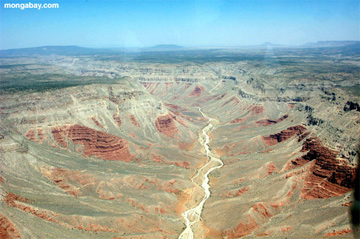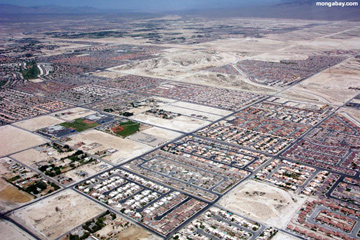Las Vegas has gotten hotter
Las Vegas has gotten hotter
mongabay.com
July 25, 2007
Las Vegas and the rest of Nevada has heated up over the past 30 years, but it’s not the entertainment industry that is responsible.
A new study by the U.S. Public Interest Research Group reports that, as a state, Nevada has seen one of the largest increases in average temperature over the last three decades.
Reno lead Nevada cities with last year’s June through August temperatures 7 degrees about its 30-year average. The average temperature last summer for Las Vegas was 3.6 degrees above normal.
“The scientific evidence of global warming is incontrovertible, and Nevada is feeling the heat more intensely than most of the rest of the U.S.,” Stephen M. Rowland, Professor of Geology at University of Nevada, Las Vegas, told the Associated Press. “Only a tiny bit of this increase in temperature can be attributed to increased urbanization the so-called urban heat-island effect. “Global warming is here, and we better get serious about confronting it.”

Desert canyon in Arizona (top); Outskirts of Las Vegas (bottom). Photos by Rhett A. Butler |
The environmental lobby group compared temperature data for 2000-2006 from 255 weather stations across the country with average temperatures for the 30 years spanning 1971-2000. Nationwide the average temperature during the summer of 2006 was at least half a degree above the 30-year average at 82 percent of the stations, according to the report.
Globally, 2006 was the fifth-warmest year in the past century, after 2005, 1998, 2002, and 2003 (in descending order by warmest year), according to NASA, though 2007 is currently on pace to eclipse it in terms of average temperature.
The U.S. Public Interest Research Group urged Congress to pass legislation — The Safe Climate Act in the House and the Global Warming Pollution Reduction Act in the Senate — to significantly reduce greenhouse gas emissions.
“The heat is on Congress to take decisive action to curb global warming. To protect our environment, our economy, and future generations, we can’t settle for less,” said U.S. PIRG Federal Global Warming Program Director Emily Figdor.
This article used quotes and information from the A.P. and the U.S. Public Interest Research Group
